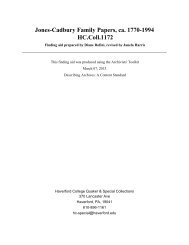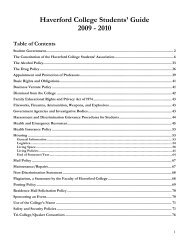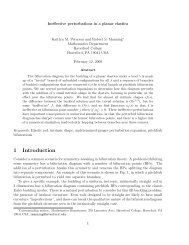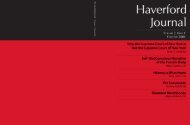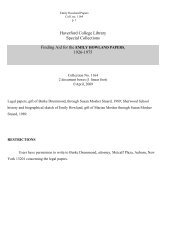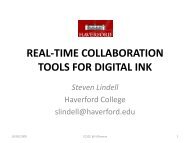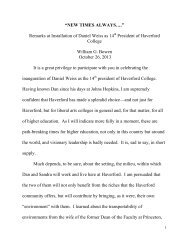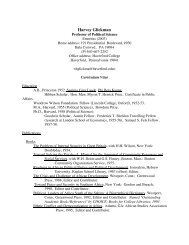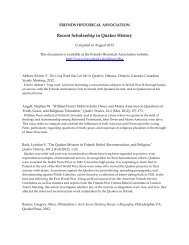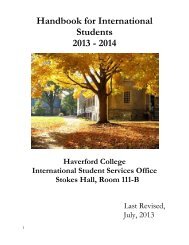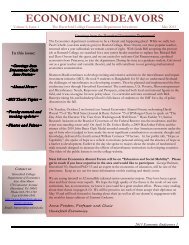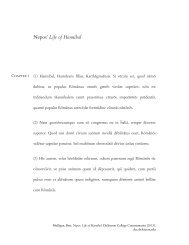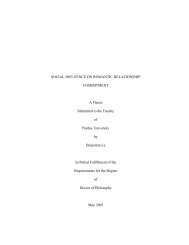Spring 2002 - Haverford College
Spring 2002 - Haverford College
Spring 2002 - Haverford College
You also want an ePaper? Increase the reach of your titles
YUMPU automatically turns print PDFs into web optimized ePapers that Google loves.
Jerry Levin<br />
cal parallels. There really was nothing in<br />
anybody’s experience to prepare us for<br />
this. History is usually our teacher. But<br />
here there was no precedent for any kind<br />
of normal psychological assistance.<br />
People looked to me for compassion and<br />
understanding—even hugs and physical<br />
embraces—responses you don’t associate<br />
with CEOs. Increasingly, if you look<br />
at it philosophically, the company’s soul<br />
was coming to the fore. It had always<br />
been there. It had always led us to substantial<br />
public service. But now, it was<br />
taking precedence. The line between<br />
what a government does and what a<br />
company does blurred. We assumed the<br />
role of security, which we had always<br />
looked at as mainly a governmental function.<br />
And I don’t just mean physical security,<br />
although our networks now, I think,<br />
are understood to be rather important in<br />
the war on terrorism, but psychological<br />
security. Then, finally, if we ever needed<br />
an object lesson of what the role of journalism<br />
is, September 11th and its aftermath<br />
have helped teach us. Just compare<br />
what was occupying all of us a year ago<br />
or the subjects you covered in your book<br />
to what’s happening now. Trivia and<br />
celebrity hype have given way to the job<br />
of providing insight and understanding<br />
so that people can grasp what’s happening.<br />
The importance of real information,<br />
of global and local information—the<br />
heart of journalism, became paramount.<br />
KALB I want to talk much more about<br />
that very point, but I want to clear up just<br />
one thing here. You said, with respect to<br />
September 11, again that our entire society<br />
has begun to doubt itself, question its<br />
values, perhaps seek the false security of<br />
withdrawal and retreat. What did you<br />
mean by that?<br />
LEVIN It’s that simple. We can’t hide from<br />
what’s happened.<br />
KALB That’s right.<br />
LEVIN If you can’t explain the evil, then<br />
at least we still have the power to reaffirm<br />
our own sense of values not just in words<br />
but in acts. Evil must be resisted. That job<br />
doesn’t begin and end with the military,<br />
it includes the defense of our culture, our<br />
heritage, the defense of moral values like<br />
freedom and tolerance. We sent around a<br />
quote—actually Dick Parsons did this—<br />
that C.S. Lewis had written in 1939, right<br />
at the onset of the invasion of Poland.<br />
Lewis basically said that this is not a new<br />
era—we’ve always known that we were<br />
on the razor’s edge, and the most interesting<br />
advances in human culture and<br />
have usually come in our darkest hours.<br />
Crisis often returns us to the fundamentals.<br />
This is true in journalism as well as<br />
music and theatre. We saw that curiously<br />
played out even in the camps in Germany.<br />
There is something about the human spirit<br />
that rises up when it’s challenged by this<br />
inexplicable force. I’m simply saying we<br />
can’t retreat. We have to recognize a constant<br />
human need to affirm the good. I<br />
took a lot of philosophic comfort, certainly<br />
as a college student, in reading<br />
about the Resistance Movement in the<br />
Second World War. People like Camus—<br />
a favorite of mine—might have lost faith,<br />
but through resistance, rebellion, and in<br />
certain cases, death, they never surrendered<br />
to evil. Whether it was an uprising<br />
in the ghetto, or what took place on the<br />
plane that went down in Pennsylvania—<br />
it’s all part of this fight against evil which<br />
persists and always will.<br />
KALB I’m puzzled in one respect here. In<br />
several months you are going to join a<br />
fairly large army of former CEOs of AOL<br />
Time Warner, but before you made your<br />
announcement last week, before you<br />
became an effective lame duck, you had<br />
given the bully pulpit that you’ve referred<br />
to also, given the bully pulpit, you had<br />
the built-in power center. You could talk<br />
and people would listen to you and try to<br />
figure out what is journalism really getting<br />
at here because you were recognized<br />
as a power. Now, I don’t want to make you<br />
feel bad on this thing, but once you leave<br />
power and there’s a glowing record of that<br />
here in Washington, D.C., once you leave<br />
it people then look to the new power center.<br />
They’re not that interested then in<br />
what it is that a former has said. So why<br />
leave now—it is given everything you’ve<br />
been telling us now—you have such—<br />
you have so much more of an opportunity<br />
to express yourself from the bully pulpit,<br />
why go?<br />
LEVIN This is the most difficult issue for<br />
me to articulate because you’re giving me<br />
the arguments that my wife gave me, and<br />
she said no one will listen to you after<br />
May. I’ve wrestled with this. It is certainly<br />
true that one of the reasons I’ve been<br />
so intense about this issue for quite some<br />
time, is because it relates to my own family,<br />
my son, and also, to the moral heritage<br />
of my company. Henry Luce, in his will,<br />
said that Time, Inc. should be run in the<br />
public interest as well as the interest of<br />
shareholders. I grew up with that.<br />
Increasingly, I do believe that the dividing<br />
line between government, nonprofits,<br />
the educational world, and the private sector<br />
needs to be altered. We need to re-orient<br />
the kinds of people we’d like to be<br />
CEOs. We need to imprint on them a<br />
sharp sense of financial responsibility, of<br />
course, of truthfulness and integrity, but<br />
“I believe that discipline is very important. I would compare it to the operation of a government<br />
or a public agency or of a nonprofit organization where you don’t have the<br />
discipline of that financial performance, of meeting objectives in order to provide the<br />
resources to be reinvested.”<br />
24 <strong>Haverford</strong> Magazine



